Related Research Articles

The United Federated Forces of the Symbionese Liberation Army was a small, American militant far-left organization active between 1973 and 1975; it claimed to be a vanguard movement. The FBI and wider American law enforcement considered the SLA to be the first terrorist organization to rise from the American left. Six members died in a May 1974 shootout with police in Los Angeles. The three surviving fugitives recruited new members, but nearly all of them were apprehended in 1975 and prosecuted.

The California League is a Minor League Baseball league that operates in California. Having been classified at various levels throughout its existence, it operated at Class A-Advanced from 1990 until its demotion to Single-A following Major League Baseball's 2021 reorganization of the minor leagues. The league temporarily operated for the 2021 season as the Low-A West before reassuming its original moniker in 2022.

Rodney Glen King was an African American man who was a victim of police brutality. On March 3, 1991, he was severely beaten by officers of the Los Angeles Police Department (LAPD) during his arrest after a high speed pursuit for driving while intoxicated on the I-210. An uninvolved resident, George Holliday, saw and filmed the incident from his nearby balcony and sent the footage, which showed Mr. King on the ground being beaten after initially evading arrest, to local news station KTLA. The incident was covered by news media around the world and caused a public uproar.
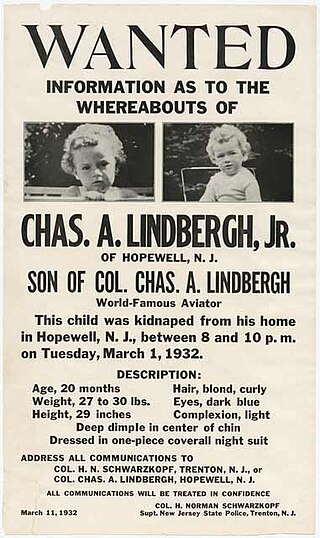
On March 1, 1932, Charles Augustus Lindbergh Jr., the 20-month-old son of colonel Charles Lindbergh and his wife Anne Morrow Lindbergh, was abducted from his crib in the upper floor of the Lindberghs' home, Highfields, in East Amwell, New Jersey, United States. On May 12, the child's corpse was discovered by a truck driver by the side of a nearby road.

Joseph Aloysius Wambaugh, Jr. is an American writer known for his fictional and nonfictional accounts of police work in the United States. Many of his novels are set in Los Angeles and its surroundings and feature Los Angeles police officers as protagonists. He won three Edgar Awards, and was named a Grand Master by the Mystery Writers of America.
A home invasion, also called a hot prowl burglary, is a sub-type of burglary in which an offender unlawfully enters into a building residence while the occupants are inside. The overarching intent of a hot prowl burglary can be theft, robbery, assault, sexual assault, murder, kidnapping, or another crime, either by stealth or direct force. Hot prowl burglaries are considered especially dangerous by law enforcement because of the potential for a violent confrontation between the occupant and the offender.

The Onion Field is a 1973 nonfiction book by Joseph Wambaugh, a sergeant for the Los Angeles Police Department, chronicling the kidnapping of two plainclothes LAPD officers by a pair of criminals during a traffic stop and the subsequent murder of one of the officers.

Following the historic Lindbergh kidnapping, the United States Congress passed a federal kidnapping statute—known as the Federal Kidnapping Act, 18 U.S.C. § 1201(a)(1) —which was intended to let federal authorities step in and pursue kidnappers once they had crossed state lines with their victim. The act was first proposed in December 1931 by Missouri Senator Roscoe Conkling Patterson, who pointed to several recent kidnappings in the Missouri area in calling for a federal solution. Initial resistance to Patterson's proposal was based on concerns over funding and state's rights. Consideration of the law was revived following the kidnapping of Howard Woolverton in late January 1932. Woolverton's kidnapping featured prominently in several newspaper series researched and prepared in the weeks following his abduction, and were quite possibly inspired by it. Two such projects, by Bruce Catton of the Newspaper Enterprise Association and Fred Pasley of the Daily News of New York City, were ready for publication within a day or two of the Lindbergh kidnapping. Both series, which ran in papers across North America, described kidnapping as an existential threat to American life, a singular, growing crime wave in which no one was safe.
John Leonard Orr is an American convicted serial arsonist, mass murderer and former firefighter. A fire captain and arson investigator in Glendale, California, Orr was convicted of serial arson and four counts of murder; he is believed to have set nearly 2,000 fires in a thirty-year arson spree, most of them between 1984 and 1991, making him the most prolific serial arsonist in American history.
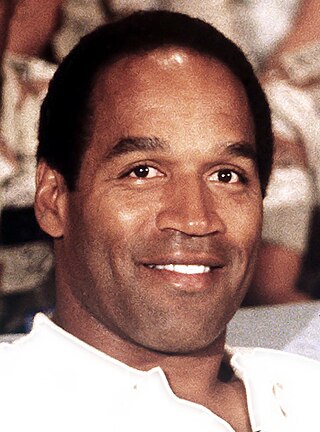
Orenthal James Simpson was an American football player, actor, and media personality who played in the National Football League (NFL) for 11 seasons, primarily with the Buffalo Bills. Regarded as one of the greatest running backs of all time, his professional success was overshadowed by his trial and controversial acquittal for the murders of his former wife Nicole Brown and her friend Ron Goldman in 1994.

The Choirboys is a 1977 American comedy-drama film directed by Robert Aldrich, written by Christopher Knopf and Joseph Wambaugh based on Wambaugh's 1975 novel of the same name. It features an ensemble cast including Charles Durning, Louis Gossett Jr., Randy Quaid, and James Woods. The film was released to theaters by Universal Pictures on December 23, 1977.
The Onion Field is a 1979 American neo-noir crime drama film directed by Harold Becker and written by Joseph Wambaugh, based on his 1973 true crime book of the same name. The film stars John Savage, James Woods and Franklyn Seales, as well as Ted Danson in his film debut.
Christian Karl Gerhartsreiter is a German convicted murderer and impostor. Born in West Germany, he is currently serving a prison sentence in the U.S. state of California. After moving to the U.S. in his late teens, Gerhartsreiter lived under a succession of aliases while variously claiming to be an actor, a director, an art collector, a physicist, a ship's captain, a negotiator of international debt agreements, and an English aristocrat.
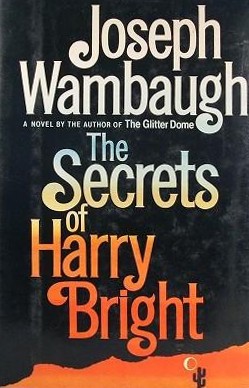
The Secrets of Harry Bright is the seventh novel written by former Los Angeles Police Department detective Joseph Wambaugh. Published in 1985, the book continues a pattern of Wambaugh crime fiction beginning with The Choirboys that uses black humor to explore the psychological effects of prolonged stress on veteran police officers. As with all his novels, The Secrets of Harry Bright, set in November 1984, is contemporaneous with the time frame in which it was written and includes numerous allusions and references to events and personalities of the time.

The Black Marble is a 1980 mystery/romantic comedy film directed by Harold Becker and starring Robert Foxworth, Paula Prentiss and Harry Dean Stanton. It is based on the 1978 novel by Joseph Wambaugh.
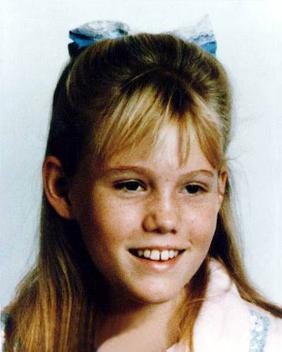
On June 10, 1991, Jaycee Lee Dugard, an eleven-year-old girl, was abducted from a street while walking to a school bus stop in Meyers, California, United States. Searches began immediately after Dugard's disappearance, but no reliable leads were generated, even though several people witnessed the kidnapping. Dugard remained missing for over 18 years until 2009, when a convicted sex offender, Phillip Garrido, visited the campus of the University of California, Berkeley, accompanied by two adolescent girls, who were discovered to be the biological daughters of Garrido and Dugard, on August 24 and 25 of that year. The unusual behavior of the trio sparked an investigation that led Garrido's parole officer, Edward Santos Jr. to order Garrido to take the two girls to a parole office in Concord, California, on August 26. Garrido was accompanied by a woman who was eventually identified as Dugard.

The following events occurred in March 1963:

Gregory Ulas "Greg" Powell was an American criminal who kidnapped Los Angeles Police Department Officers Ian Campbell and Karl Hettinger on the night of March 9, 1963. Assisted by accomplice Jimmy Lee "Youngblood" Smith, Powell took the officers to an onion field near Bakersfield, California, where Officer Campbell was fatally shot.
Jimmy Lee Smith, also known as Youngblood, was an American criminal who assisted Gregory Powell with the kidnapping of Los Angeles Police Department officers Ian Campbell and Karl Francis Hettinger on the night of March 9, 1963. There, Smith and Powell took Campbell and Hettinger to an onion field near Bakersfield, California, where Campbell was fatally shot. Infamously known as one of the "Onion Field" killers, Smith's story was depicted in Joseph Wambaugh's 1973 nonfiction book The Onion Field. The book was adapted into a 1979 feature film of the same name in which Smith was portrayed by Franklyn Seales.
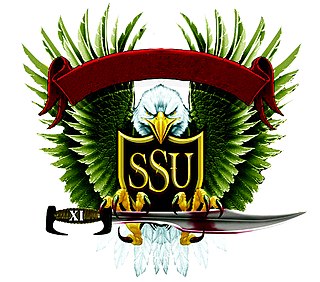
The Special Service Unit (SSU) is a component of the California Department of Corrections and Rehabilitation (CDCR). It functions as the special operations division of CDCR. The unit is staffed by special agents assigned to field offices throughout the state. Although the special agents work for CDCR, they are neither correctional officers nor parole agents. SSU special agents are full-time peace officers per California Penal Code Section 830.2. This makes agents more akin to state police officers than to correctional officers.
References
- ↑ Niemi, Robert (2013). Inspired by True Events: An Illustrated Guide to More Than 500 History-Based Films, 2nd Edition: An Illustrated Guide to More Than 500 History-Based Films. ABC-CLIO. ISBN 9781610691987. page 489
- ↑ "Karl Hettinger; 'Onion Field' Officer, 59". The New York Times . 6 May 1994. Retrieved 19 May 2016.
- ↑ "Karl Hettinger". The Blade (Toledo, Ohio) . 5 May 1994. Retrieved 19 May 2016.
- ↑ "Karl Hettinger, 'Onion Field' figure". The Telegraph (Nashua) . 5 May 1994. Retrieved 19 May 2016.
- ↑ Maslin, Janet (9 December 1979). "Movie's translation of book bogs down in details". Lawrence Journal-World . Retrieved 19 May 2016.
- ↑ "A look at criminals can be too close up". The Sydney Morning Herald . 2 November 1980. Retrieved 19 May 2016.
- ↑ Hazlett, Terry (4 December 1979). "Onion Field Gripping; Probable Oscar Contender". Observer–Reporter . Retrieved 19 May 2016.
- ↑ Dresser, Norman (9 November 1979). "'Onion Field' Outstanding For Its Acting And Story". The Blade (Toledo, Ohio) . Retrieved 19 May 2016.
- ↑ Original data: State of California. California Birth Index, 1905-1995. Sacramento, CA, USA: State of California Department of Health Services, Center for Health Statistics.
- ↑ Wambaugh, Joseph (2008). The Onion Field. Random House Publishing Group. ISBN 9780307489128.
- 1 2 Brooks Clark; Bill Hewitt; Kim Hubbard; Richard Jerome; Mark Lasswell; Shelley Levitt; J.D. Reed; Susan Schindehette (3 April 1995). "Bearing Witness". People . Retrieved 19 May 2016.
- ↑ "CHAPTER 3. Kidnapping". California Legislative Information. Retrieved May 14, 2020.
- 1 2 Malnic, Eric (5 May 1994). "Karl Hettinger; Survived 1963 'Onion Field' Attack". Los Angeles Times . Retrieved 19 May 2016.
- ↑ "One of 2 Abducted Police Officers Is Shot to Death". The Spokesman-Review . 11 March 1963. Retrieved 19 May 2016.
- ↑ Barton, Gene (18 July 1982). "Ex-detective rips court for 'Onion Field' reversal". The Bulletin. Retrieved 19 May 2016.
- ↑ McCabe, Bruce (7 August 1994). "State governments are betting on gambling revenue". The Baltimore Sun . Retrieved 19 May 2016.
- ↑ "Newtown tragedy is a reminder that police, first responders also suffer PTSD Cory Franklin". The Guardian . 20 March 2013. Retrieved 19 May 2016.
- ↑ Turan, Kenneth (14 October 1979). "The Onion Field Caper". The Washington Post . Retrieved 19 May 2016.
- ↑ Skelton, Nancy (27 June 1985). "'Onion Field' Survivor Lashes Out at Bird, High Court". Los Angeles Times . Retrieved 19 May 2016.
- ↑ Bigham, Joe (27 June 1985). "SURVIVOR OF "ONION FIELD" CASE ASKS NO PAROLE FOR KILLER". Associated Press . Retrieved 19 May 2016.
- ↑ "'Onion-Field' Killer Has Hearing". Observer-Reporter . 27 June 1985. Retrieved 19 May 2016.
- ↑ "'Onion Field' victim calls for Bird ouster". Lodi News-Sentinel . 8 August 1985. Retrieved 19 May 2016.
- ↑ "'Onion Field' Officer Gets Supervisor Post". Los Angeles Times . 19 March 1987. Retrieved 19 May 2016.
- ↑ Nathan, Gabriel L. (2001). For a Tin Star: Honoring America's Slain and Living Police Officers. Turner Publishing Company. ISBN 9781563117183. page 97